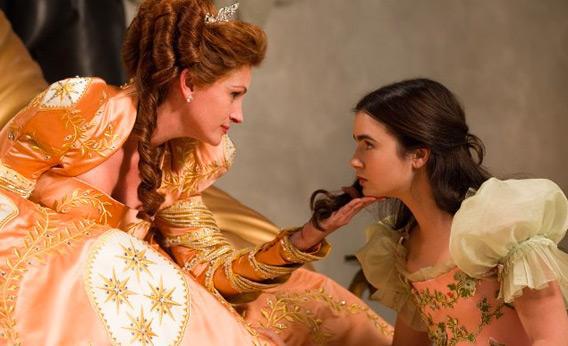If Mirror Mirror (Relativity) were one of the seven dwarves, it would be Dopey. Tarsem Singh’s movie might not have the magic of Disney’s Snow White and the Seven Dwarfs (1937), or its sense of danger, but it makes up for these deficiencies with silly fun. Mirror Mirror is an odd little fantasia of a movie—part jaunty adventure, part broad romantic comedy, part auteurist spectacle. Half the fun is figuring out what the hell you’re watching.
The story itself remains fairly simple. The Evil Queen (Julia Roberts) rules over a palace inhabited by her stepdaughter, the princess Snow White (Lily Collins), who she sees as a rival. Bound for the palace is a charming prince (Armie Hammer), who is in the market for a wife. Soon the three will become tangled up in an intergenerational love-triangle, with the aging queen and the young princess fighting over the handsome prince.
As in any good fairytale, the twists begin in the forest. When we first meet the seven dwarfs (played by seven little people, many of them veteran actors), they’re bandits powerbocking on top of spring-loaded stilts. With a series of flips and kicks they soon subdue the gallant prince, stealing his money and clothes and leaving him to enter the queen’s court without his royal raiment. (A bare-breasted Armie Hammer will become something of a recurring joke.) Both queen and princess fall for the half-nude Hammer. The queen first uses her declining charms, then more deadly witchery, to win his affections. Her murderous plans soon force Snow White to flee the palace and take shelter with the dwarfs. From there the adventures include but are not limited to a bird-shit facial (apparently it has excellent anti-aging qualities), an excess of silly hats, and a bewitched Hammer licking palace partygoers like a puppy. Snow White, meanwhile—in an admirable inversion of the traditional tale—must learn not to let the smitten prince and dwarfs fight her battles for her, but rather to face her enemies on her own. Indeed, in the end it’s the princess who must save the prince. In this way Mirror Mirror doesn’t just reflect the traditional tale; it flips it.
The movie is also helped along by some superb casting, particularly in the supporting roles. As the queen’s spineless chief steward, Nathan Lane wrings a few hearty laughs out of unpromising material. As the dwarf Napoleon (these more self-respecting dwarfs don’t use the classic Disney names), Jordan Prentice brings a surly wit that’s almost too good for this campy movie (we soon learn that he dreams of becoming a hairdresser). The principal players are more hit and miss. Hammer is the best of the bunch, playing the dashing prince with just the right tincture of irony, flapping his cape and flashing his impossibly white teeth. Yet he also proves game to go whole hog when the screenplay calls for it.
As the princess, Collins is steady if not a standout. (Most striking is her uncanny resemblance to Audrey Hepburn.) As the queen, Julia Roberts flits as quickly between types (ice queen, old maid, cougar) as her character cycles through husbands—in one of the movie’s best lines, it’s said that the queen “radiates crazy.” There’s a meta-aspect to casting Roberts as an aging queen who must compete with a shiny young starlet. Roberts was once a princess herself, of course, and is now entering a more mature phase of her career. You could say it was game of Roberts to take on the role of an aging beauty who feels she must cram herself into a corset, though the movie only pushes so far in this direction: The queen’s wrinkles don’t show nearly as much as her mirror says they do. But Roberts has devilish fun with the role nonetheless, and enough to upstage her waifish co-star.
Director Tarsem Singh (The Cell, The Fall, Immortals) seems to aspire to make grand masterpieces with each project he takes on, and though the results fall short, they’re at least more interesting than the more predictable alternatives. In The Fall he made an art-house fairy tale that—largely due to his own screenplay—never arrived at a compelling story, focusing instead on visual splendor for its own sake. Like Spike Jonze—who lent his name as a presenter of The Fall—Tarsem got his start in music videos, where hallucinatory imagery can stand up on its own. Here, however, Tarsem has learned to offset his excessive tendencies with a little camp, arriving at a tone closer to the fantasy comedies of Terry Gilliam (Time Bandits, The Imaginarium of Doctor Parnassus). By the time the Bollywood dance number plays over Mirror’s closing credits, bringing one last note of offbeat silliness (Tarsem, who is Indian, co-wrote the song), you might just find yourself feeling like another one of Disney’s dwarfs: Happy.
